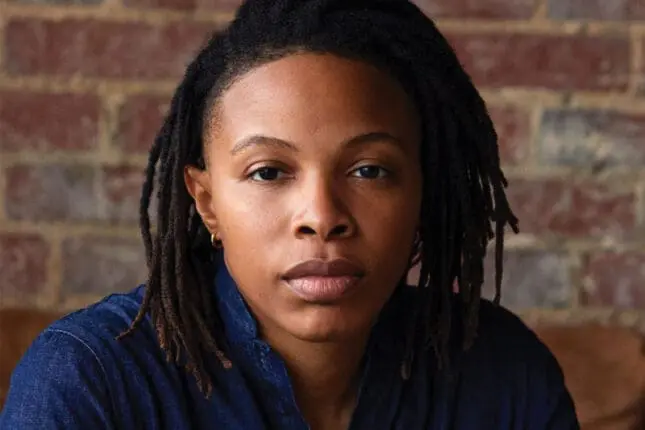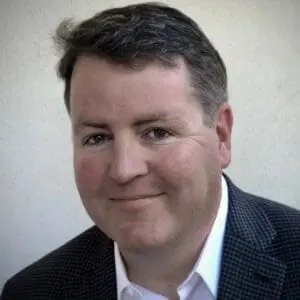Social change is public. It occurs in the halls of government buildings, in rallies on streets, and on ballots in voting booths. It happens when we talk to neighbors, give speeches, and write passionate social media posts about issues we believe deserve people’s attention. We move society in a new direction when we march, fundraise, and tirelessly disseminate information that will open people’s eyes to deep truths.
Right?
As a therapist, somatics teacher, and political organizer, Prentis Hemphill believes there’s another, seldom acknowledged route to social change: one that exists within a more personal space of listening, feeling, and healing. A “politicized healer”—someone who bridges individual healing work with collective political work—Hemphill believes that to create a just world, we need to do the hard, personal work of embodying the change we want, work that therapists are in a unique position to facilitate.
As a cofounder of The Embodiment Institute, Hemphill has worked with conflict resolution and leadership transitions, on individual and organizational levels, all through the lens of somatic healing. We spoke in the winter of 2023 to better understand this approach to individual and societal transformation.

Ryan Howes: How did you get into the somatics field?
Prentis Hemphill: In my previous experiences with social-change work, I noticed an unspoken undercurrent among us organizers that affected how and what we were able to do. It had to do with the fact that so many of us brought our own trauma histories to the work: our own pain and our own sense of what needed to change in our lives and in the world. Focusing on external work was really important, but not tending to how our history shaped our work and relationships meant we often hurt each other. Then I stumbled into somatics. It answered a lot of questions for me about how our individual lives connect to the broader change we’re seeking.
RH: Somatics seems so private and personal, and social change seems so grand and public. How do the two relate?
Hemphill: How do they not relate? We’re all shaped by the world we live in—the things we struggle with and the resources we have available to us—and in turn, we shape the world right back. That has political implications, if not a political root.
Maybe you have a lot of resources and feel nervous about losing them, or you don’t feel like you belong within the greater population. Either scenario shapes your relationships, your politics, and who you are on a fundamental level. That, to me, is why you can’t separate personal from social change.
Justice isn’t just a question of rights or even resources. It’s also about how we feel as individuals and who’s allowed to feel what—which is so often dictated by our history and by society. Feeling is deeply political to me. Liberating feeling is important for whatever justice project you’re working on.
RH: You’re saying that some of our social constructs limit people’s feelings, and part of therapy is to help liberate people from that?
Hemphill: Yes, I get excited about what’s possible for society if we can do that and help people be in relationship.
RH: On a practical level, how would a therapist do this?
Hemphill: Well, the body guides. The body communicates. Our bodies are constantly responding to what’s happening internally (the stories we keep retelling) and to the external world. When we work through and with the body in its own language, things can be revealed that we might not even know how to access otherwise. Complex feelings can be allowed expression through the body, and therapists can create the kind of environment the body needs for this to happen. Letting the body lead, making it safe enough for someone to feel and listen to their body, is about restoring an essential relationship. Too often we end up treating our bodies as things we have to control, rather than places where we listen. Creating a space where we can listen to the stories in our body is critical. And what we hear often has a collective resonance, historically and generationally.
Many collective experiences influence the individual body, but the individual body can influence the collective. So why can’t we encourage people to do things in their community or in the world that start to address some of the historical residue and pain they experience individually? Why not encourage them to take meaningful action within the scope of what’s possible for them, and to explore what it is to build a sense of power and agency?
RH: “What are you noticing in your body?” is a powerful question for you.
Hemphill: Yeah, because it’s almost like we’ve turned the volume all the way down on our sensations and turned the volume all the way up on everything external. When we can learn to listen to the body, it opens up a whole world of possibility.
RH: Some therapists would argue against the idea of bringing social justice work into the therapy office, saying it’s not our purview and works against therapeutic neutrality. What are your thoughts on that?
Hemphill: I wish that so-called neutrality actually existed, but I don’t think it does. Still, you don’t need to force anything on anyone. You don’t need to force people to take actions they’re not comfortable with or ready for. But if you listen closely to people, you’ll hear that what they’re sometimes trying to address in their individual lives are collective anxieties. Or you’ll hear a sense of powerlessness, frustration, or anger at the way things are being handled in the world.
If we don’t address that, we end up acclimatizing people to present conditions, or inadvertently reinforcing a sense of powerlessness in the world. I believe that part of any healing—individually and collectively—is about restoring our agency in the world, our sense that we can do things that matter, that make a difference. I think it’s a part of healing.
Inside of social-change movements, there’s been a longtime struggle over whether there’s a place for individual healing, for therapeutic work. I get that. I also get therapists’ struggle around the idea that social change can be part of individual healing.
One of the things I tell people on both sides is that it’s important for people to have power in their lives. The first place I experienced power was in my own body, in my own ability to take what’s happening inside of me seriously.
RH: You’re trying to tap into the body as a starting point to empowerment?
Hemphill: When I speak, for instance, I can transmit what I’m saying more clearly if I can be seated in my body, in my feeling, in my honesty and authenticity. That to me is the foundation of power. Once we get to that place, we can build power together as human beings. A lot more is possible that way.
If we’re really talking about power and agency, it has to be felt. It’s not a concept: it’s a feeling, and feeling in the body always has nuance to it. I’m not sure therapists are always open to seeing that nuance. Because we’re all rooted in our own centers and in our own feelings, we’re not always able to open up the breadth of feeling that can exist within our clients. I think this moment is calling on us to live a little bit more in that spaciousness and make ourselves less susceptible to reactionary narrowing, which is limiting. I want more for us.
RH: As a practitioner, do you face times when somatic work isn’t necessarily a good idea? I’ve heard people say things like, “If someone’s dealing with panic attacks, getting in touch with the body might just amplify things.” Has that been your experience?
Hemphill: I understand that caution, but the body is the center of everything for me. Even when feeling is activating, I believe the body is still the resource someone needs in that moment. It may not be their own body; they may need another body for grounding, or even to contact the body of the earth. But whether you can access deeper feeling in the moment, any change that takes place in what’s happening inside of you is a bodily, physiological change.
We have many ways to go about creating that change, but even with the best talk therapy I’ve ever done, when something shifts, I take a deep breath, I shudder, I let something go. We don’t pay attention to that necessarily. Ultimately, the most effective therapists are always operating physiologically, always helping something shift in the body. To me, that’s what it means to center the body in healing work.
Ryan Howes
Ryan Howes, Ph.D., ABPP is a Pasadena, California-based psychologist, musician, and author of the “Mental Health Journal for Men.” Learn more at ryanhowes.net.















